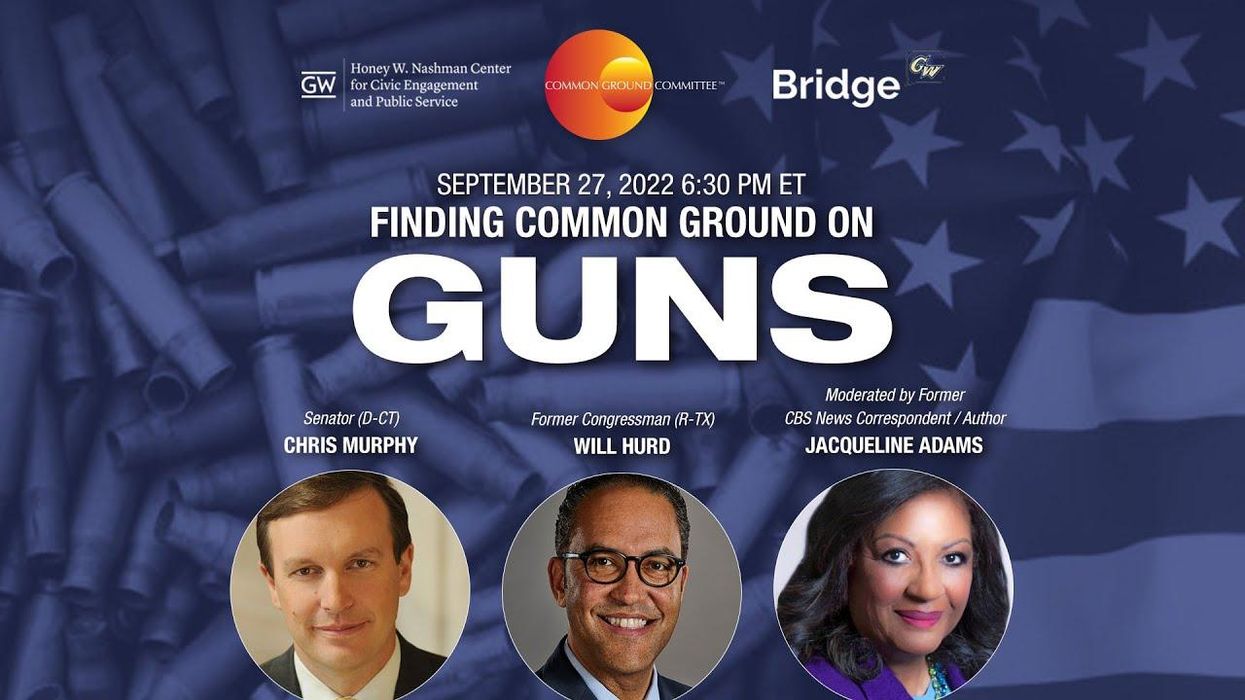In June, President Biden signed the first significant gun control legislation in a generation, culminating a process that would have failed without public support and bipartisan cooperation in the Senate.
While some will say the Bipartisan Safer Communities Act is the culmination of a social movement that kicked into a higher gear following the murder of 20 Newtown, Conn., elementary school students in 2012, a Democratic senator and former Republican House member came together Tuesday evening to discuss ways to achieve even more.
Sen. Chris Murphy of Connecticut, one of the architects of the new law, and ex-Rep. Will Hurd, who represented Uvalde, Texas, for three terms, were the featured guests at a Common Ground Committee event to explore where the nation goes next on gun policy.
Murphy and Hurd agreed that two factors drove Congress’ ability to get beyond partisanship and pass significant gun control legislation: demand from the American public and strong inter-party relationships in the Senate.
“There was an imperative from the public to ... get beyond our politics and make some progress,” said Murphy, who led negotiations with Republican Sen. John Cornyn of Texas while Democratic Sen. Kyrsten Sinema brought in other Republicans.
“It starts with Chris and John Cornyn having the tenacity to stick with this,” Hurd said, but agreed that popular sentiment had shifted in favor of action following the May 24 shooting in Uvalde that resulted in the deaths of 19 children and two teachers. “The public was tired. Fifty percent of teenagers are afraid of getting shot at school. That’s nuts.”
The new law takes a few big steps, including funding implementation of states’ “red flag” laws, closing the “ boyfriend loophole,” requiring stronger background checks for people under age 21 who attempt to buy a gun, requiring more gun sellers to conduct background checks, and establishing new gun crimes for purchasing a gun on behalf of another person.
However, the law does not address some gun control ideas that are popular with the American public.
For example, 92 percent told Gallup in June that they favor background checks for all gun purchases. In March 2021, the House passed a bill that would require universal background checks. Like this summer’s bill, fewer than a dozen Republicans supported it. Murphy introduced a similar bill in the Senate, but that measure never made it out of the Judiciary Committee.
“Its always had massive public support and yet it couldn’t pass. I think the only way you can explain that is through the power of the NRA,” Murphy said.
But Hurd warned against giving the National Rifle Association too much credit for preventing the passage of that measure, or other bills.
“An overreliance on just one entity would take away from how complicated this is and the need to educate members and for people to be active on these types of issues,” he said.
Hurd and Murphy both took issue with polling data that showed Democrats and Republicans divided over whether it’s more important to control gun ownership or protect the right to own guns.
“I think most Americans actually would say we can do both, we can actually protect people’s right to own guns and regulate that right. And the two are not mutually exclusive,” Murphy said.
“When you start with an issue that we agree on, then you can start talking about the things that we should be doing to ultimately solve the problem,” Murphy said.
Both men support an individual’s right to own a gun but believe that right can be regulated, including limiting the type of weapons people can purchase. However, Hurd noted, the politics of gun control has changed significantly since Congress passed a since-expired assault weapons ban in 1994.
“The environment was different on this particular issue,” he said. “There are other things that we should be focusing on in order to start building the momentum to get up to an issue of talking specifically about the weapon.”
While acknowledging data shows limits on assault weapons would likely reduce the number of gun-related murders, Murphy agreed that such a regulation likely isn’t feasible in the current state of politics. According to Gallup, 55 percent of Americans believe there should be a ban on manufacturing, owning or selling assault rifles.
So what’s next for legislation addressing gun violence? Hurd and Murphy expressed optimism that the social movement for changing gun laws has picked up momentum and there is more to come. But if Republicans win control of the House of Representatives in November, gun control advocates will find a far more difficult road to victory.
Nevertheless, they remain hopeful.
“I think the public demands a response,” Hurd said.




















Trump & Hegseth gave Mark Kelly a huge 2028 gift